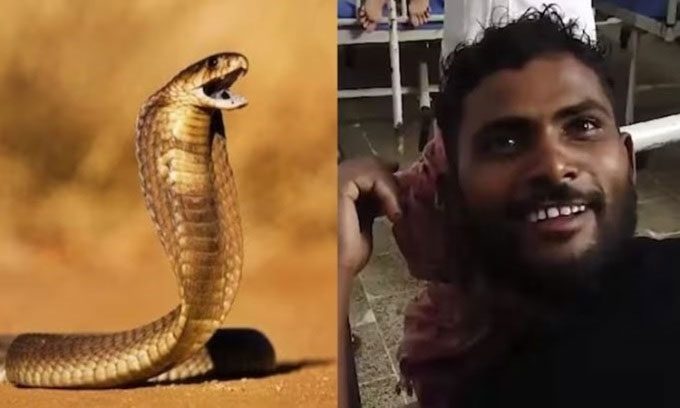A man in India fought back against a venomous snake, resulting in its immediate death after it attacked him.
35-year-old railway worker Santosh Lohar was working in the forest near Nawada city in Bihar, India, when the incident occurred on the night of July 2. As Lohar was going to sleep, the snake suddenly lunged at him and bit him. Lohar reacted swiftly by grabbing the snake, biting it back twice, and killing it, according to Newsweek.

Santosh Lohar (right) survives a rare accident. (Photo: India Today).
In some regions of India, there is a superstition that biting a snake helps to transfer the venom back into its body. “In my village, people believe that if you are bitten by a snake, you must bite it back twice to neutralize the venom,” Lohar shared. Authorities have not yet confirmed the species of the snake involved in the attack. After the incident, Lohar was taken to the hospital by colleagues. He stayed overnight at the hospital, recovered well after receiving antivenom, and was discharged the following day.
India is home to many diverse snake species, including several highly venomous ones. Some of the most dangerous snakes in the country include the Indian cobra, common krait, Russell’s viper, and the saw-scaled viper. These four species are sometimes referred to as “The Big Four” due to their potent venom and high rates of snakebite injuries. Additionally, India also has the king cobra and the krait.
According to a 2020 study, Russell’s viper alone accounted for 43% of snakebite cases in India from 2000 to 2019, followed by the krait at 18% and the cobra at 12%. Agricultural workers, rural residents, and those living near snake habitats are at higher risk of being bitten by venomous snakes.
The same study reported 1.2 million deaths from snake bites between 2000 and 2019 (an average of 58,000 cases per year). Approximately 1.11 to 1.17 million snakebite cases occur annually, with 70% resulting in envenomation. The venom from these species often contains neurotoxins that cause symptoms such as blurred vision, eyelid swelling, shortness of breath, and hemotoxins that disrupt blood clotting, leading to pain, swelling, bruising, and bleeding. The research team emphasized that a significant number of fatalities and severe consequences from venomous snake bites could be avoided with timely administration of effective antivenom.


















































